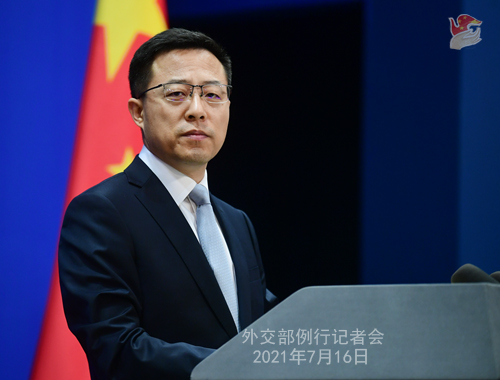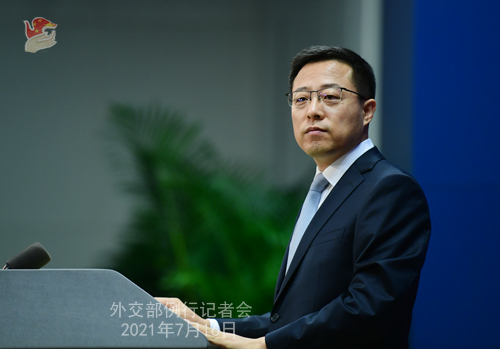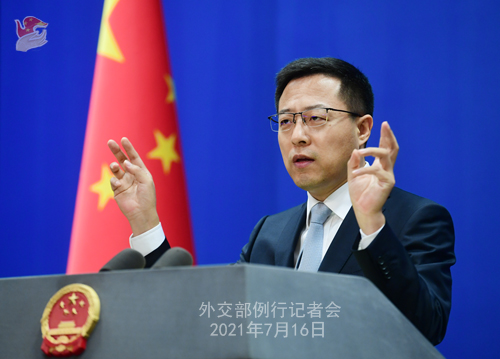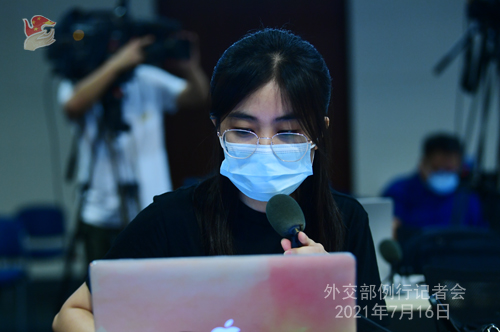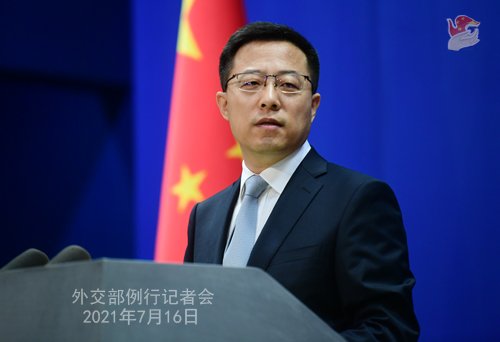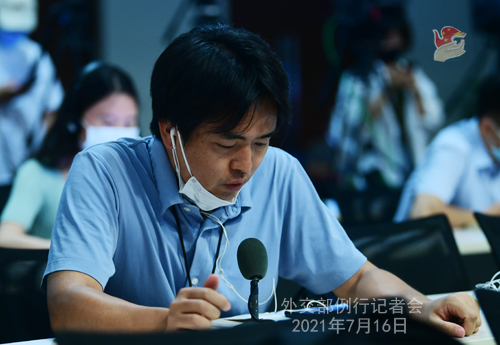| Foreign Ministry Spokesperson Zhao Lijian's Regular Press Conference on July 16, 2021 |
| 2021-07-16 20:03 |
|
CCTV: On July 15, State Councilor and Foreign Minister Wang Yi visited Uzbekistan. What are the outcomes of this visit? Zhao Lijian: On July 15 local time, State Councilor and Foreign Minister Wang Yi visited Uzbekistan. He met with President of Uzbekistan Shavkat Mirziyoyev and exchanged views with Foreign Minister Abdulaziz Kamilov on bilateral relations. State Councilor Wang Yi said that next year will mark the 30th anniversary of the establishment of diplomatic ties between China and Uzbekistan and the development of bilateral relations stands at a new historical starting point. The two sides should, as always, firmly support each other's choice of development path and principled positions on issues concerning each other's core interests. China is ready to work with Uzbekistan to prepare for the celebrations of the 30th anniversary of the establishment of diplomatic ties, jointly plan for the development of bilateral relations in the next 30 years and open up a broader prospect of the mutually beneficial cooperation for the benefit of the two countries and two peoples. China supports Uzbekistan in hosting the SCO Samarkand Summit in 2022 and stands ready to work with Uzbekistan to further promote the development of the SCO. President Mirziyoyev extended warm congratulations on the 100th anniversary of the founding of the Communist Party of China (CPC) and expressed sincere admiration for China's development achievements. He expressed the willingness to understand and learn from China's development experience, especially its experience in poverty reduction, and the hope to replicate China's miracle in his country. The Uzbekistan-China relationship has made great progress despite the epidemic, with bilateral trade and investment growing rapidly. Uzbekistan would like to take the the 30th anniversary of the establishment of diplomatic ties as an opportunity to formulate a new five-year cooperation plan with China, inject new impetus into bilateral cooperation and work with China to score greater development of the SCO. Global Times: Recently there are media reports that the US has not only inflicted discrimination and unfair treatment on Muslims at home over the years, but also waged wars against countries including Iraq and Syria, leading to massive civilian casualties of Muslims. What the US does to Muslims has become the best textbook example of the opposite of the so-called universal values touted by the US. Do you have any comment? Zhao Lijian: The US knows better than anyone else how it has treated Muslims at home and abroad, and people around the world also have a clear judgment on that. The US has a long history of discrimination and unfair treatment of its own Muslims. After the September 11 attacks, the Muslim community in the US has been impacted unprecedentedly, suffering discrimination in life and work and various hate crimes and abuses. In January 2017, the US administration issued a "Muslim ban", making things even worse for Muslims in the US. Media reports commented that American Muslims face political discrimination and isolation because of their faith, just as Catholics did a century and a half ago. Though the US administration rescinded the ban, the Statement from the President on the Beginning of Ramadan issued in April this year acknowledged that "Muslim Americans continue to be targeted by bullying, bigotry, and hate crimes". According to a US survey, 75% of Muslim adults in the US said there is a lot of discrimination against Muslims in American society, a view shared by 69% of the general public. 50% of American Muslims said it has become more difficult to be a Muslim in the US in recent years. The suffering of American Muslims is like a magic mirror, which reveals the US hypocrisy in touting "human rights first" and "universal values". The US has also waged wars in Afghanistan, Iraq and Syria in the name of "anti-terrorism", resulting in untold casualties of Muslim civilians. The US has turned a blind eye to its deplorable human rights record and abuses in relation to Muslims, and instead repeatedly fabricated lies about Xinjiang. This is pure hypocrisy and double standard. Though some in the US keep saying how much they care about Muslims, the Chinese people are not buying any of that nonsense, not even when pigs fly. What the US should do is to reflect on itself and earnestly solve its own Muslim human rights problems, rather than slander other countries under the pretext of caring about Muslim human rights.
Hubei Media Group: The semi-annual report of China's economy was released yesterday. When the world economic recovery is facing more uncertainties and prominent imbalances, how will China's economic performance benefit the world? Zhao Lijian: In the first half of 2021, China keeps consolidating its achievement in COVID-19 containment and economic and social development. China's economy has recovered and kept on moving in a positive direction while maintaining stability, and has demonstrated great resilience and vibrancy. China's GDP expanded 12.7% year on year in the first half of this year with adjustments and improvements in the economic structure, stronger driver for innovation, higher quality and efficiency overall and sustained betterment of people's livelihood. China's economy has been growing steadily with a more open market and improving business environment and sustained good momentum in foreign trade. China is opening its door wider to the world and will inject more positive energy into the global economic recovery. In the latest China Economic Update, the World Bank Group raised the growth projection of China's economy this year from 8.1% to 8.5%. It pointed out that the strong recovery in East Asia and the Pacific in 2021 is mainly attributed to China's growth. It expects that China will contribute to more than a quarter to the global economic growth. China's sound economic momentum will give a strong boost to bring the post-COVID world economy back onto the right track, regain confidence and achieve growth. Macau Monthly: During the past month or so, remains of more than 1,100 Indigenous children have been found on the grounds of former residential schools run by the Catholic Church in Canada. On July 15 local time, the Tk'emlúps te Secwépemc First Nation held a press conference and released the initial report obtained by using ground penetrating radar to detect the site of an Indian boarding school in Kamloops. Another 200 children's graves were found, after remains of 215 Indigenous children had been found earlier. These successive discoveries have laid bare Canada's grave systemic racism issue and drawn much attention from all social sectors at home and beyond. A recent media report says that the Indian Act, which was passed in 1876 and remains valid after several revisions, provides legal basis for the Canadian government's "lawful" predation and persecution against the Indigenous peoples. Does China have any comment on this? Zhao Lijian: One piece of damning evidence after another. The successive discoveries of all the remains and unmarked graves of Indigenous children in Canada are simply shocking. However, this may have only revealed the tip of the iceberg in Canada's racism issue. The Indian Act you mentioned bears witness to the tribulations of the Indigenous groups in Canada over the past centuries. The 1894 revision of this act made residential school attendance compulsory for Indigenous children between 7 and 16 years of age. Their long hair was cut short and they were prohibited from speaking their native language and practicing their culture. According to incomplete statistics, from the end of the 19th century to the end of the 20th century, the Canadian government forcibly sent at least 150,000 Indigenous children to the so-called residential schools. The Truth and Reconciliation Commission of Canada pointed out that the aim of the Canadian government is to deprive the Indigenous people of their land and resources for the benefit of the colonizers and to commit cultural genocide against the Indigenous groups. The Indian Act also deprives the Indigenous peoples of the space for subsistence and development. It stipulates that the Canadian government is empowered to take or use lands in a reserve for public purposes such as railway, electricity grid and roads without the consent of the Indigenous peoples and without compensation. Indigenous peoples have no ownership over resources such as minerals, coastal waters and wetlands in their reserves, which means they don't have enough resources for subsistence. Many Indigenous people have to forfeit their status and rights as Indians and leave home to make a living in cities, where, tumbled between mainstream exclusion and assimilation, they end up living a marginalized life. A Canadian researcher pointed out that the Indian Act, formulated by dominant colonizers, consists of unequal terms the Canadian government imposed upon the Indigenous peoples. The Canadian government should ask itself, when will it end the repression and deprivation of Indigenous peoples? When will it restore justice to the Indigenous peoples and give a responsible account to history and the world?
CRI: Protests and demonstrations have continued in several places in South Africa, triggering violence and riots such as vandalizing, looting and arson attacks. Chinese nationals in South Africa have been affected, and some Chinese nationals and employees of Chinese companies have suffered severe losses. Do you have any comment? Zhao Lijian: China is highly concerned about the latest development in South Africa. We support the South African government's effort to stop violence and chaos, and believe that under the leadership of President Ramaphosa, it will restore social order and economic stability at an early date. Some Chinese nationals have suffered severe property damage and their life and safety have been seriously threatened. We express concern over that and have asked relevant departments of the South African government to step up protection of Chinese nationals and companies in the country. The South African side has promised that they will ramp up efforts to protect the property and safety of Chinese nationals in South Africa. Xinhua News Agency: Today marks the 20th anniversary of the signing of the Treaty of Good-neighborliness and Friendly Cooperation between China and Russia. How do you see the role the Treaty has played in China-Russia relations in the past two decades? What's the significance of celebrating the extension of the Treaty against the current international landscape? Zhao Lijian: Today marks the 20th anniversary of the signing of the Treaty of Good-neighborliness and Friendly Cooperation between China and Russia. The concept of long-standing friendship and the principles of a new type of international relations enshrined in the Treaty are a major initiative in international relations. They have laid a solid legal foundation for the long-term, sound and steady development of China-Russia relations in the new century and identified basic principles for the friendly cooperation between the two countries across the board. Today's China-Russia relationship is growing even stronger and solid as a rock. It has become a bilateral relationship between two major countries and neighbors with the highest level of mutual trust, coordination and strategic value. Looking back at the development of China-Russia relations since the beginning of this century, the signing of the Treaty is undoubtedly a major event of milestone significance. Today, State Councilor and Foreign Minister Wang Yi and Russian Foreign Minister Sergei Lavrov jointly published commemorative articles on Chinese and Russian mainstream media. They review and summarize the outcomes and experience of the bilateral ties, highlight the mission of keeping to the original aspiration of signing the Treaty, and advocate the main theme of long-standing friendship, so as to contribute wisdom and strength, elevate China-Russia comprehensive strategic partnership of coordination for a new era to a higher level and inject more positive energy to the world undergoing turbulence and changes. No matter how the international situation evolves, China and Russia's resolve to develop and deepen their comprehensive strategic partnership of coordination for a new era will remain unchanged, the sincerity of the two sides to help and reinforce each other will remain unchanged, and the original aspiration of long-standing friendship and win-win cooperation will remain unchanged. The two sides stay committed to building a model of relationship that features mutual assistance, win-win results, close people-to-people ties and efforts to uphold fairness and justice. We have full confidence in the future of China-Russia relations in the new era. China News Service: Yesterday, China held the Palestine-Israel Peace Symposium for the fourth time. Could you offer more details? Zhao Lijian: On July 15, China held a Palestine-Israel Peace Symposium via videolink. State Councilor and Foreign Minister Wang Yi delivered an address and the meeting was chaired by Zhai Jun, Special Envoy of the Chinese Government on the Middle East Issue. The symposium was attended by peace advocates from both Palestine and Israel, who were led by Ahmad Majdalani, the secretary general of the Palestinian Popular Struggle Front (PPSF) and a member of the PLO's Executive Committee (EC) and Yossi Beilin, former Israeli Justice Minister and the initiator of Geneva Initiative, a non-governmental organization for Palestinian-Israeli peace effort. State Councilor and Foreign Minister Wang Yi elaborated on China's views and propositions on how to advance Palestine-Israel peace under current circumstances. He stressed that it is important to reaffirm the conviction in peace and expand the ranks of peace advocates; to advocate an attitude of mutual accommodation and move forward the peace talks; to act in a spirit of solidarity and alleviate the humanitarian hardships; to stick to the two-state solution and deliver fairness and justice. At the symposium, people dedicated to peace between Palestine and Israel adopted consensus document and reiterated that the two-state solution is the only viable way. They hope the international community will work for the adoption of a UN resolution reaffirming the two-state solution. They hold that regional countries should normalize relations with Israel within the framework of the Arab Peace Initiative. They call on all parties to support their effort in promoting peace. The two sides also spoke highly of China's enduring dedication to advancing the Palestine-Israel peace process and hoped China will play a bigger role to this end. The purpose of China holding this symposium is to create a platform for the exchange of views, to expand the ranks of peace advocates, build momentum for peace, explore a path to peace, seek a way of coexistence, and contribute to resumption of peace talks on the basis of the two-state solution. Going forward, China will continue to hold the Palestine-Israel Peace Symposium as long as the Palestinian and Israeli sides are willing. Our efforts to promote peace through talks will not cease until the Palestinian question is resolved.
Bloomberg: The WHO Director-General called on China to cooperate in the second phase of studying the origins of the coronavirus. My question is, does China plan to cooperate and allow people into China for the second phase? Zhao Lijian: China has taken note of the the draft proposed by WHO Director-General Tedros Adhanom Ghebreysus and the WHO Secretariat for origins study, which are being studied by experts on the Chinese side. China's position on the issue of global origin-tracing is consistent and clear. Origins study is a scientific issue. All parties should respect the opinions of scientists and scientific conclusions, instead of politicizing the issue. The plan for the next phase of global origins study should be led by member states and agreed upon through consultation. In March this year, WHO released the report on the joint WHO-China study, which reached important conclusions including that lab leak is extremely unlikely, that we need to continue to search for possible early cases globally and further understand the role of cold chains and frozen foods in the transmission of the virus. This is a scientific and authoritative report, which laid the basis for the next stage of global origin-tracing work. CCTV: On July 15, WHO Director-General Tedros Adhanom Ghebreyesus told a news conference that investigations into the origins of the COVID-19 pandemic in China were being hampered by the lack of raw data on the first days of spread there. "We ask China to be transparent and open and to cooperate," he said, adding that it is premature to rule out a lab leak as the origin and more study is needed. Do you have any comment? Zhao Lijian: The fact is, China showed raw data that requires special attention item by item when the joint mission was conducting the origins study in China. Foreign experts said on multiple occasions that the expert group has access to large amounts of data and information and fully understands that some data cannot be copied or taken abroad as it concerns personal privacy. During the study, the joint mission made field trips to institutions including the Hubei Provincial Center for Disease Control, the Wuhan Center for Disease Control and the Wuhan Institute of Virology, and visited biosafety laboratories and had in-depth, candid and science-oriented exchanges with experts there. Through these field trips and in-depth visits, members of the mission unanimously agreed that the hypothesis of lab leaking is extremely unlikely. The above-mentioned points are fully and unequivocally captured in the WHO report of the joint study released in March this year. On the issue of origins study, all should respect science and the opinion and conclusion of scientists with an objective and unbiased attitude. On July 15, 48 countries sent letters to the WHO Director-General on the issue of origins study. They welcome the publication of the report of the WHO-convened global study of origins of SARS-CoV-2: China Part, support the effort to conduct the origins study around the world and oppose politicization of origins tracing. This reflects the strong appeal from the international community. RIA Novosti: According to diplomatic sources, Foreign Minister Wang Yi will visit Syria on Saturday and will hold talks with his Syrian colleague, and also probably he will meet with President Bashar al-Assad. I'm wondering if you could confirm this information? Zhao Lijian: I don't have anything to release at the moment. Please follow up for more.
Nikkei: It's been reported that US Deputy Secretary of State Wendy R. Sherman expressed hope to visit China, but the offer was declined by China. Can you offer more information on this? Zhao Lijian: China's position on China-US relations is consistent and clear. As to the specifics you asked about, I have nothing to read out at this moment. Beijing Daily: On this morning, the launching ceremony of the national emission trading market was held simultaneously in Beijing, Shanghai and Wuhan. This is a major institutional innovation for China to reduce green house gas emissions by harnessing market-oriented mechanisms and promote green and low-carbon development. It's an important policy tool to achieve the goals of carbon peaking, carbon neutrality and nationally determined contribution and has received much attention and excited expectation at home and abroad. What does this decision mean for the global response to climate change? Zhao Lijian: Since 2015, President Xi Jinping has made important announcements on the development of a carbon market on many international occasions. On April 22, 2021, President Xi Jinping announced at the Leaders Summit on Climate that China's national carbon market will start trading. This is a major measure taken by China to facilitate emissions reduction of industries by harnessing market-oriented mechanisms. China has decided that carbon emissions trading market will commence trading on July 16. Carbon emissions by the companies covered in the first batch of trading are estimated to exceed 4 billion tonnes. This means China's carbon trading market, once launched, will become the world's largest in terms of the amount of greenhouse gas emissions covered. This will add new impetus and confidence to global cooperation on climate change and provide inspirations for other countries and regions in the world. Climate change poses an increasingly severe challenge to human survival and development. China will strive to achieve carbon peak by 2030 and become carbon neutral by 2060. China has committed to move from carbon peak to carbon neutrality in a much shorter time span than many developed countries. This is a major strategic decision made by China based on its responsibility to build a community with a shared future for mankind and the inherent requirement to achieve sustainable development. It will make its own contribution to promoting global climate governance and building a community of life for man and nature. AFP: The US State Department announced yesterday that Deputy Secretary Wendy Sherman will travel to Japan, South Korea and Mongolia on her upcoming East Asia trip. Is there any reason China is not on the list, considering some outlets previously reported that she would also visit China? Zhao Lijian: I just answered this question and have nothing to add. Reuters: According to a Reuters report citing sources, the US is preparing to sanction a number of Chinese officials today over the crackdown on democracy in Hong Kong. Do you have any comment on this? Zhao Lijian: China's position on issues relating to Hong Kong is clear and consistent. I'd like to stress that Hong Kong is part of China and its affairs are purely China's internal affairs. No country has the right to make wanton criticism and meddle in them. The Chinese government is firmly determined to oppose US interference in Hong Kong affairs, safeguard national sovereignty, security and development interests, and implement One Country, Two Systems. The US should adhere to international law and basic norms governing international relations, stop meddling in Hong Kong affairs in any form and stop interfering in China's domestic affairs. China will respond strongly to possible US measures.
|
| |||||||||||||||
|
|||||||||||||||


